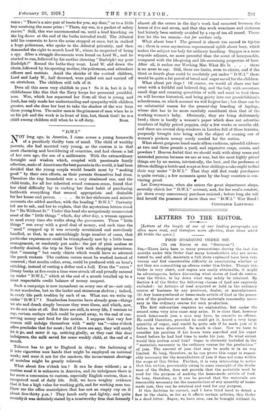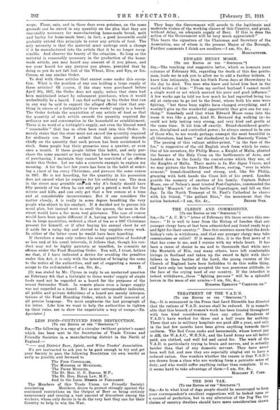LETTERS TO TELE EDITOR.
[Letters of the length of one of our leading paragraphs are often more read, and therefore more effective, than those which fill treble the space.] FOOD HOARDING ORDER 1917.
[To TIM EDITOR OF THE "SPECTATOR.".]
Sra,—There have been so many prosecutions during the last few months under this Order that many householders who are accus- tomed to, and still, maintain a full store cupboard have been very uneasy and find considerable difficulty in ascertaining whether or not they are committing an offence under this Order. Though this Order is very short, and copies are easily obtainable, it might be advantageous, before discussing what stores of food do contra- vene the Order, to lay down what may safely be retained. By Section 4 of the Order the following classes of food are expressly excluded : (a) Articles of food acquired or held in the ordinary course of business by any producer, dealer, or manufacturer. (b) Any home-produced or home-made article of food in the posses- sion of the producer or maker, or the materials reasonably neces- sary in the ordinary course for such production.
The first sub-section requires no explanation, but under the
second some very nice cases may arise. It is clear that, however much home-made jam a man may have, he commits no offence. He could therefore, provided he could get it, hoard a very large quantity of sugar, and would be quite safe if he made jam of it before he were discovered. So much is clear. Nov we have to consider his position if his house were searched and his sugar found before he had had time to make his jam. To what extent would this section avail him? Sugar is obviously included in the " materials necessary in the ordinary course for the production" of jam. The amount of jam that may be made is in no way limited. So long, therefore, as he can prove this sugar is reason- ably necessary for the manufacture of jam it does not come within the scope of this Order. Further, it is very interesting Co notice that this section, presumably owing to some oversight of the drafts- man of the Order, does not provide that the materials need be used for the purpose of making the home-made article of food. So long, therefore, as it can be proved that the materials are reasonably necessary for the manufacture of any quantity of home- made jam, they can be retained and used for any purpose.
If this doctrine be correct, and I have tried hard to detect a flaw in the chain, so far as it affects certain articles, this Order is a dead letter. Sugar, we have seen, can be brought without its
scope. Flour, oats, and in these days even potatoes, on the same grounds can be stored in any quantity on the plea that they are reasonably necessary for manufacturing home-made bread, malt and barley for home-made beer; in fact, a good housewife could probably extend this principle to cover any article of food. The only necessity is that the material must -undergo such a change if it be manufactured into the article that it be no longer recog- nizable. And observe the beauty of the situation. So long as the material is reasonably necessary in the production of the home- made article, you may hoard any amount of it you please, and use your hoard for any purpose you please, provided that by doing so you do not fall foul of the Wheat, Rice, and Rye, or Ice.. Cream, or any similar Order.
To deal with those articles that cannot come under this excep- tion. What is the position of any one holding a large supply 'of these articles? Of course, if the store were purchased before April 9th, 1917, the Order does not apply, unless that store had been maintained intact by subsequent purchases, when it would undoubtedly be a hoard. I can find nothing in the Order that can in any way be said to support the alleged official view that any- thing in excess of a fortnight's or three weeks' supply is a hoard. The Order forbids the acquisition of any article of food so that the quantity of such article exceeds the quantity required for ordinary use and consumption in the household or establishment. There is no word of a fortnight's supply, not even the blessed word "reasonable" that has so often been read into this Order. It merely states that the store must not exceed the quantity required for ordinary use. Now I submit that this quantity depends chiefly on the quantity that each person has been accustomed to stock. Some people buy their groceries once a quarter, or even once a month. If these people follow this habit, and only pur- chase the same amount or less than they have been in the custom of purchasing, I maintain they cannot be convicted of an offence under this Order. Let me take a concrete example to explain my meaning. A for the last few years has been in the habit of order- ing a chest of tea every Christmas, and pursues the same course in 1917. He is not hoarding, for the quantity in his possession does not exceed what he requires for his ordinary use. The man in the street may grumble anPask why A's family should have fifty pounds of tea when he can only get a pound a week for the missus and kids, and can only get that a few ounces at a time and at considerable inconvenience. But if one considers the matter closely, A is really in some degree benefiting the very people who object to his conduct. If A decided not to pursue his usual plan, but instead went to swell the queues, the man in the street would have a far more real grievance. The case of course would have been quite different if A, having never before ordered tea in large quantities, ordered a chest of tea as a 1917 Christmas present for himself, or if after buying his annual chest he set it aside for a rainy day and started to buy supplies every week. In either of the latter cases he would have been hoarding.
If therefore a man only orders his usual quantities of foodstuff or less and at his usual intervals, it follows that, though his con- duct may not be highly patriotic or unselfish, he commits no effence under the Food Hoarding Order. You will, I trust, believe me that, if I have indicated a device for avoiding the penalties under this Act, it is only with the intention of bringing the same to the notice of the authorities, and not of suggesting a means of escape to the evil-minded.—I am, Sir, Ise., E.
[It was stated by Mr. Clynee in reply to an unstarred question en February 4th that a fortnight to three weeks' supply of staple foods need not be regarded as a hoard for the purposes of the recent Surrender Week. In remote places even a larger supply was not regarded as a hoard. But as our correspondent indicates, all public and private definitions of a hoard are merely interpre- tations of the Food Hoarding Order, which is itself innocent of all precise language. We must emphasize the last paragraph of his letter. Like him we want to help the authorities to tighten up their rules, not to show the unpatriotic a way of escape.—ED. Spectator.]



























 Previous page
Previous page